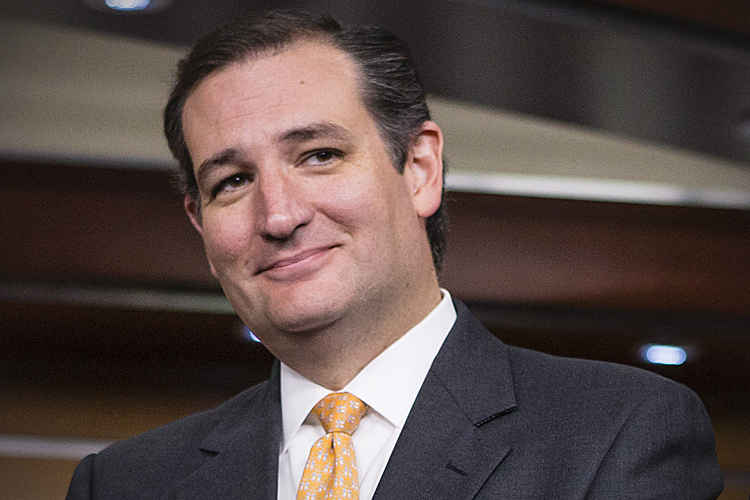Why is Ted Cruz so successful at bullying the Republican Party? What we’re seeing, in part, is a cost of going post-policy for mainstream conservatives.
I’ll start with the dynamic that may send Republicans over a cliff – with Republicans in Congress threatening to shut down the government (or possibly default the government by failing to extend the debt limit) unless Democrats surrender the Affordable Care Act – something which apparently absolutely no one, including the Republicans involved, believe will work. Instead, most people, and especially those Republicans who lived through Newt’s Folly back in 1995-1996, are certain that the GOP will bear most of the blame if there is a government shutdown.
So if most Republicans think it’s a lousy idea, why did the House just pass a Continuing Resolution that takes exactly the path that Sens. Ted Cruz and Mike Lee and their allies at Jim DeMint’s Heritage told them to take?
The dynamic that drives much of what congressional Republicans do is very simple: They are terrified of being labeled squishes, RINOs or, even worse, liberals. In any objective sense, of course, this is nonsense; polarization in the House is at record levels, meaning that there’s a clear divide between even the most moderate members, with the most liberal Republican easily more conservative than the most conservative Democrat. Nevertheless, politicians are paranoid by nature, and in a world in which conservative Utah Sen. Bob Bennett was defeated for renomination, there’s enough evidence available in recent memory for them to act on that paranoia.
In practice, what that means is that mainstream conservatives try to avoid allowing any distance between themselves and whoever can plausibly call themselves “True Conservatives” and get away with it.
But here’s where “post-policy” comes in.
Remember, Republicans have mostly just given up on developing real, conservative public policy. We saw that in the 2012 campaign, in which Mitt Romney couldn’t be bothered to come up with a tax plan that came close to adding up. We’ve seen it in the failure to come up with a “replace” bill on healthcare reform as part of their promised “repeal and replace” plan. Unlike in Ronald Reagan’s era, or even Newt Gingrich’s era (or perhaps more to the point, unlike in Jimmy Carter or Bill Clinton’s presidency), there’s no conservative policy agenda beyond just rejecting everything Democrats want.
Simply put: When you’ve reduced your entire movement to saying “no” to Barack Obama and Nancy Pelosi, is it any surprise that whoever shouts “NO” the loudest will wind up defining what counts as “conservative”?
Indeed, if you happen to be a demagogue running for president on the platform that you are the only True Conservative and everyone else is a squish or a RINO or a secret liberal, then the best plan is to find the most convoluted, self-destructive, but nevertheless very loud way of saying “no.” Which is basically what Ted Cruz and his allies have done with the demand that Republicans tie keeping the government open to defunding the ACA.
See, it doesn’t have to be this way. Imagine if Republicans approached the budget deadline this year with a substantial policy program. Perhaps they would have already passed a tax reform bill, or an immigration bill that they wanted to pass, even if it wasn’t what Democrats wanted. Perhaps it would be a comprehensive energy bill (and not just a slogan, which is what the Keystone pipeline basically is). Maybe they would have come up with a housing plan. Maybe all of those. They would have run on those programs in the first place, spent a lot of time and energy on them; they would have argued that those programs were what conservative action was all about in 2013. Not just members of the House, either; conservative think tanks and GOP-aligned interest groups would have invested resources in those programs. Many of those in the GOP-aligned media would have spent the year, and perhaps the campaign last year, talking about conservative innovation and conservative vitality and how that agenda, blocked by Obama and the Democrats, truly defined conservative thought.
Under those circumstances, Republicans really would have had something positive to fight for in the budget showdown, rather than just threaten to hold their breath until they turned blue unless Democrats repealed the ACA. But more important, cranks who suggested that strategy would have far less of a claim on being the real True Conservatives. Republican politicians would have a way to fight back – yes, they could say, we’re all against Obamacare, but real conservatives are fighting for X, Y and Z.
But there is no X, no Y and no Z. And that’s part of the reason why when Ted Cruz (or Rush Limbaugh, or anyone else who can plausibly claim to be a True Conservative) tells the party to head for the cliff, they start in that direction and may well still go right over.


